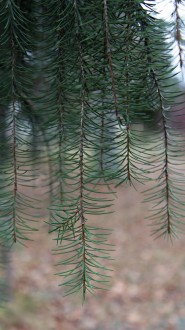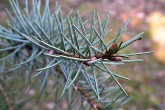(Picea breweriana S. Watson)
Habitus
- tree 30 - 40 m high with a characteristic "mourning" appearance of the crown
- from spreading whorl-like arranged main branches, soft branches of higher orders hang down from the branches like a ridge (they reach a length of up to 250 cm).
- the branches stand out almost on all sides
- from the upper side they are dark green, slightly convex
- on the lower side they have white bands of vents
Leaves (assimilation organs)
- assimilation organs are needle-like
- needles are compressed (belongs to the Omorica section) up to 3.5 cm long, usually straight, stiff
- needles stand out from the branches on almost all sides
- on the upper side they are dark green, slightly convex
- on the lower side they have white bands of vents
Extension
- originally only in a small area of North America - in a few isolated places in the Siskyau Mountains near the sources of the Illinois River in northern California and in Oregon
- discovered around 1863 by the Californian botanist W. Brewer
Significance
- park tree, it also has collection significance
- the wood of this spruce is one of the heaviest spruce woods, but the absolute rarity of the tree does not allow its economic use










